Ranking NHL teams by tiers: The top 16
This is the second part of a two-part series ranking all 32 NHL teams by tiers for the 2023-24 season. Part 1, which addresses the bottom 16 teams, was published Tuesday.
Keep in mind this exercise is rolling out roughly 10 days before training camps open, and the tiers are based on personal projections for the 2023-24 season only, not the long-term trajectories of each franchise.
Moderately dangerous (Tier 4)
Probable playoff teams unlikely to go on a deep run
Buffalo Sabres
Of the three risers in the Atlantic Division - Buffalo, Ottawa, Detroit - the Sabres have the best chance to break through. The calculus on the playoffs is pretty simple: If Buffalo can repeat last year's offensive output and take a step forward on defense, the team should make it.
While the Sabres didn't lose any key forwards in the offseason, Jack Quinn, who showed flashes of brilliance as an NHL rookie, is sidelined with an injury for approximately half the year. Rookie Jiri Kulich should fill the void just fine.
Rasmus Dahlin, Owen Power, Mattias Samuelsson, and newcomer Connor Clifton lead the blue line. How the skaters insulate goalies Devon Levi and Ukko-Pekka Luukkonen - as well as the goalies' individual performances - will go a long way in determining the Sabres' fate.
Overall, everything's gone according to plan under general manager Kevyn Adams and coach Don Granato. They've started to reap the rewards of their slow-burn build. With fans getting antsy for postseason hockey, surely the team will deploy the $8.8 million in available cap space to upgrade the roster midseason.
Calgary Flames
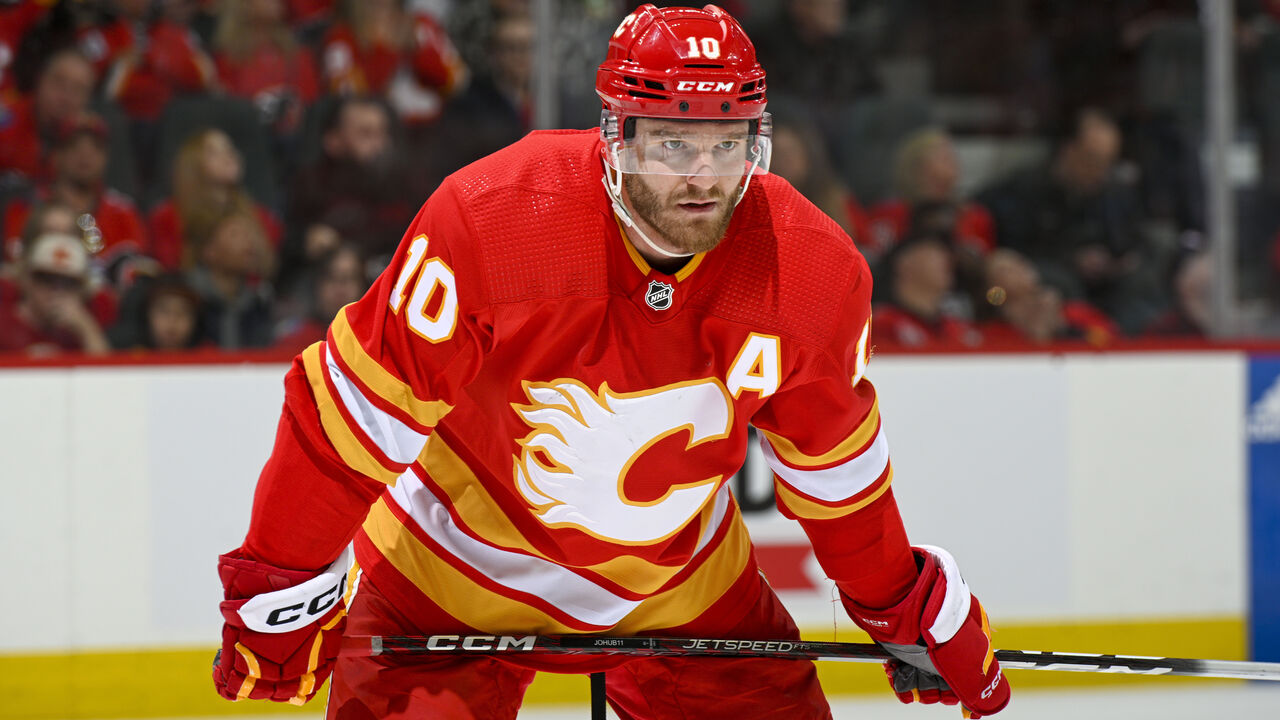
Calgary is one of the most fascinating teams in the league and also one of the most difficult clubs to get a firm handle on.
Last year was such a perfect storm of roadblocks, headlined by horrible years from starting goalie Jacob Markstrom and highest-paid skater Jonathan Huberdeau, 17 overtime or shootout losses, and coach Darryl Sutter losing the room. So you have to take missing the playoffs with a grain of salt. Yet properly evaluating the team right now is just as hard: Top goal-scorer Tyler Toffoli was traded, Ryan Huska is moving from assistant to head coach, and the futures of Elias Lindholm, Mikael Backlund, and Noah Hanifin - all in the final years of their current contracts - are hanging in the balance.
The flip side: the chaos dies down, the players get into a groove, and next thing you know, the Flames are in the Pacific Division race. I think, at worst, a Western Conference wild-card spot is theirs if they want it.
Minnesota Wild
The Wild are in salary-cap hell, with the buyouts for Ryan Suter and Zach Parise eating up $14.7 million a year through 2024-25. They have enough talent to make the playoffs for the 11th time in 12 years but don't have a roster that screams "deep run." In other words, not much has changed.
The club's biggest strength is playing as a unit under bench boss Dean Evason. Beyond the amazing Kirill Kaprizov - who's arguably a top-10 NHL player - there's a serious lack of offensive punch. (Matt Boldy's trending in the right direction, and Marco Rossi may get there by season's end.)
A sturdy blue line and the goaltending tandem of Filip Gustavsson and Marc-Andre Fleury take some pressure off the score-by-committee approach.
Prediction: The Wild snag the third spot in the Central Division.
New York Rangers
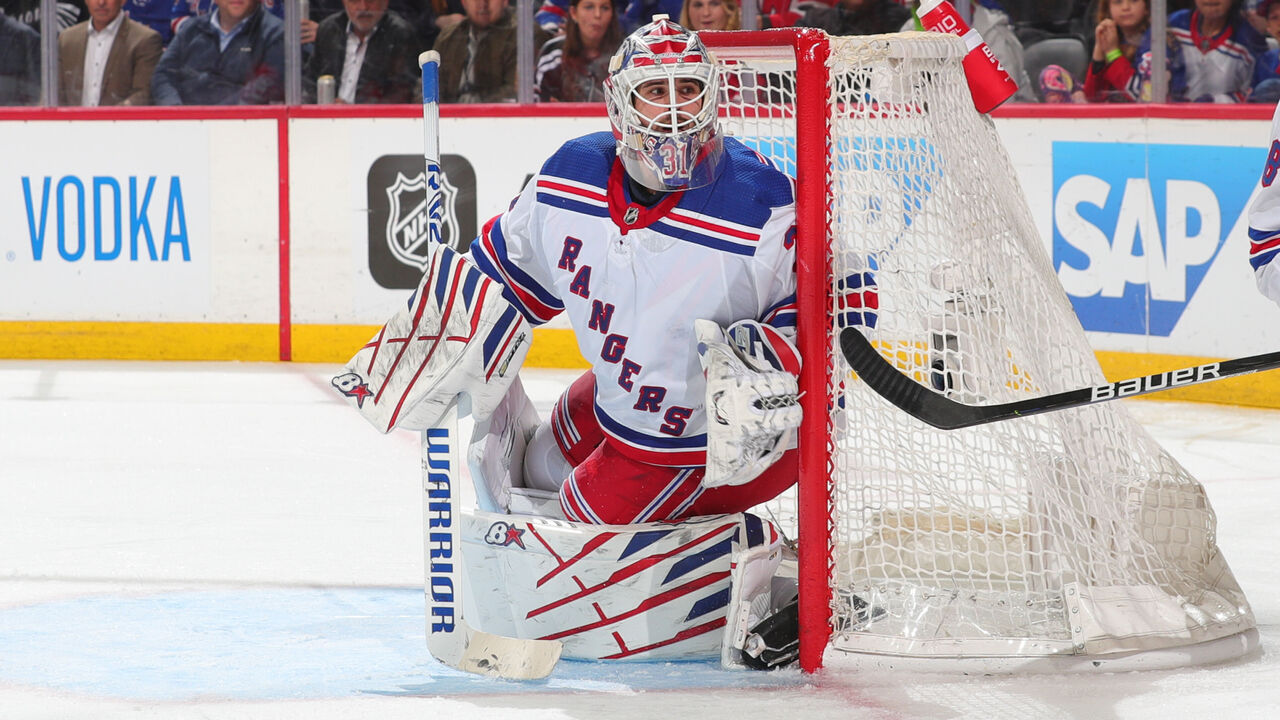
Bowing out in the first round certainly wasn't the Rangers' plan after going all-in at the most recent trade deadline. Boy, does it feel like 2023-24 is an extra-important season.
General manager Chris Drury brought in Peter Laviolette, an intense coach who might wear on players over a long period but has a track record of getting results early on. Artemi Panarin, Mika Zibanejad, Chris Kreider, and Vincent Trocheck are all in their 30s. The veteran roster hasn't been overhauled; the biggest offseason shuffle is up front, with Blake Wheeler and Nick Bonino subbing in for Patrick Kane and Vladimir Tarasenko. Everybody's wondering if 2020 first overall pick Alexis Lafreniere will ever pop and, as usual, what's in store for Kaapo Kakko, now entering his fifth season.
Igor Shesterkin broke out as a world-class goalie in 2021-22 and then regressed last year. If the Rangers want to get past New Jersey and Carolina in the playoffs, Shesterkin can't be just OK. He needs to steal a game or two.
Seattle Kraken
The Kraken finished with 100 points last year. Let that sink in for a moment. After seemingly botching the expansion draft and missing the playoffs by 37 points in Year 1, Seattle hit triple digits in points as a second-year team.
Coach Dave Hakstol deserves a ton of credit. The Year 2 squad shot from the prime scoring areas far more often and also became a threat off the rush. The attacking approach, mixed with better injury and puck luck, enabled six forwards to record 20 goals, including Jared McCann's 40-snipe explosion.
Seattle didn't alter its roster a whole lot in the offseason, which is OK. I like how general manager Ron Francis is focused on building a sustainable winner.
If Philipp Grubauer and Chris Driedger can provide decent goaltending, Shane Wright can find his footing, and Matty Beniers doesn't slump as a sophomore, the Kraken are 100% a playoff team. However, a Cup isn't within reach - yet.
Tampa Bay Lightning
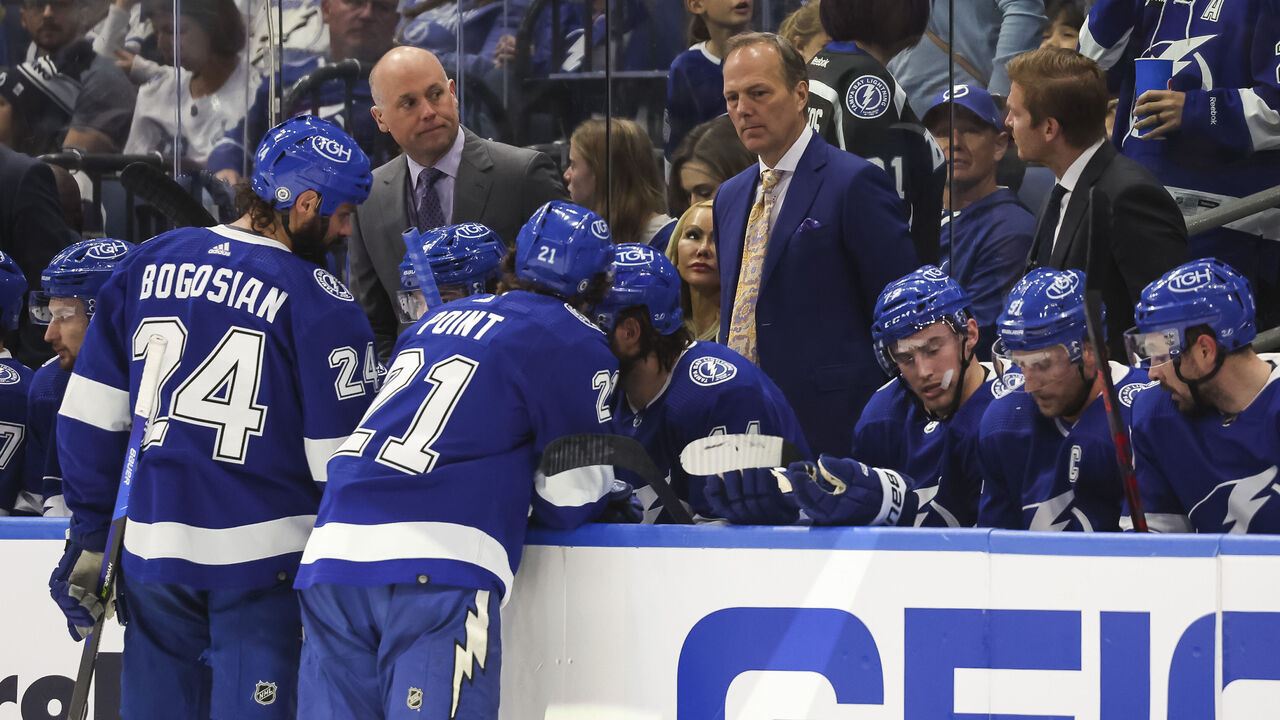
The Lightning accomplished the unthinkable from 2019-22: two Stanley Cup victories and a third Cup Final appearance in a flat salary cap world.
We began to see the impact of those long playoff runs last season. The roster looked less intimidating as the cap crunch forced another round of important depth pieces to be jettisoned. Meanwhile, the decorated core of Steven Stamkos, Victor Hedman, Nikita Kucherov, Andrei Vasilevskiy, and Brayden Point collectively ran out of gas. Losing in the first round was predictable.
A real summer break will be hugely beneficial, but the team again failed to retain depth dudes like forwards Ross Colton, Alex Killorn, and Corey Perry.
Are the third and fourth forward lines and third defenseman pairing too thin? Can new backup goalie Jonas Johansson shoulder enough of the regular-season load to ensure Vasilevskiy is fresher come playoff time? Does Hedman bounce back in 2023-24 following a down season by the Swede's lofty standards?
The Bolts are undoubtedly still a playoff team. But there's so much up in the air.
Scary at full potential (Tier 3)
Cup win not out of question, though a lot must fall into place
Florida Panthers
The good news: the Panthers are icing roughly the same team as last year. Led by coach Paul Maurice and Hart Trophy finalist Matthew Tkachuk, the reigning Stanley Cup finalist from the East is skilled, hardened, and cohesive.
The bad news: Florida's icing roughly the same team that was the eighth seed going into the playoffs. Yes, a few notable changes to the lineup mean the squad that caught fire after barely squeaking into the postseason will be an underdog of sorts again. Complicating matters, stud defensemen Aaron Ekblad and Brandon Montour are both question marks to start the season thanks to offseason surgeries.
Who knows what kind of goaltending they'll get. For all of his brilliance in the 2023 playoffs, veteran starter Sergei Bobrovsky can be super inconsistent. Spencer Knight, the netminder of the future, missed a huge chunk of 2022-23 after entering the NHL/NHLPA player assistance program. The 22-year-old is back at the rink, which is fantastic, though expectations should be tempered.
The Panthers don't have a first-round pick in 2024 or 2025 or a second in 2024. That lack of draft capital could handcuff general manager Bill Zito's ability to improve the club ahead of the trade deadline.
Los Angeles Kings
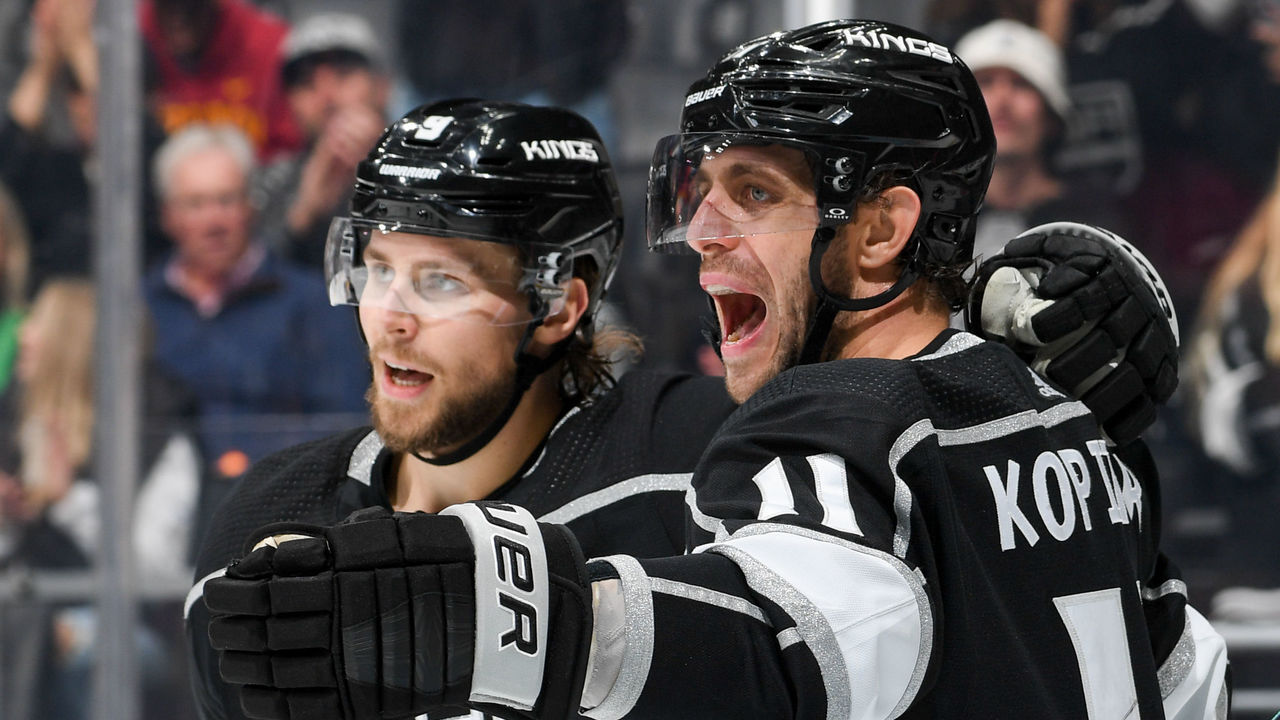
It's safe to say the rebuild initiated by general manager Rob Blake, which led to last and second-last finishes in the Western Conference to end the 2010s, has accomplished half its mission. The Kings have dutifully become an annual playoff team again - but a Cup win has yet to materialize.
In fact, a playoff series win has yet to materialize since the Kings won the Cup in 2014. This season, then, is about taking a step forward in the postseason. Winning a round or two would be huge for LA, a club now boasting arguably the best one-through-four center depth in the league: Anze Kopitar, Pierre-Luc Dubois, Phillip Danault, and Blake Lizotte.
All 32 teams could really benefit from their prospects and young NHLers leveling up in 2023-24, but it's especially true for the Kings considering how important Quinton Byfield, Arthur Kaliyev, Alex Turcotte, Brandt Clarke, and Jordan Spence are to what they're all building toward.
Franchise pillars Kopitar and Drew Doughty start the season aged 36 and 33, respectively. Their clocks are ticking.
Pittsburgh Penguins
Realistically, the Penguins have two or three good years left of magic between Sidney Crosby, Evgeni Malkin, and Kris Letang. The organization is highly motivated to throw caution to the wind to squeeze out every possible win and then start from scratch once Crosby retires.
Kyle Dubas was appropriately bold in his first offseason as hockey operations boss in Pittsburgh, reeling in Erik Karlsson and Ryan Graves for the blue line and Reilly Smith, Lars Eller, and Noel Acciari for the forward group. The 2023-24 roster is undeniably improved. Karlsson, who posted a ridiculous 101 points for a terrible San Jose team last season, will bring much-needed mobility while eating up enough minutes to give Letang a lighter load.
The Pens have an excellent coach and a top-10 roster. Their X-factors are the health of the Big Three - Malkin is 37, Crosby and Letang are 36 - and the performance of goalie Tristan Jarry.
Toronto Maple Leafs
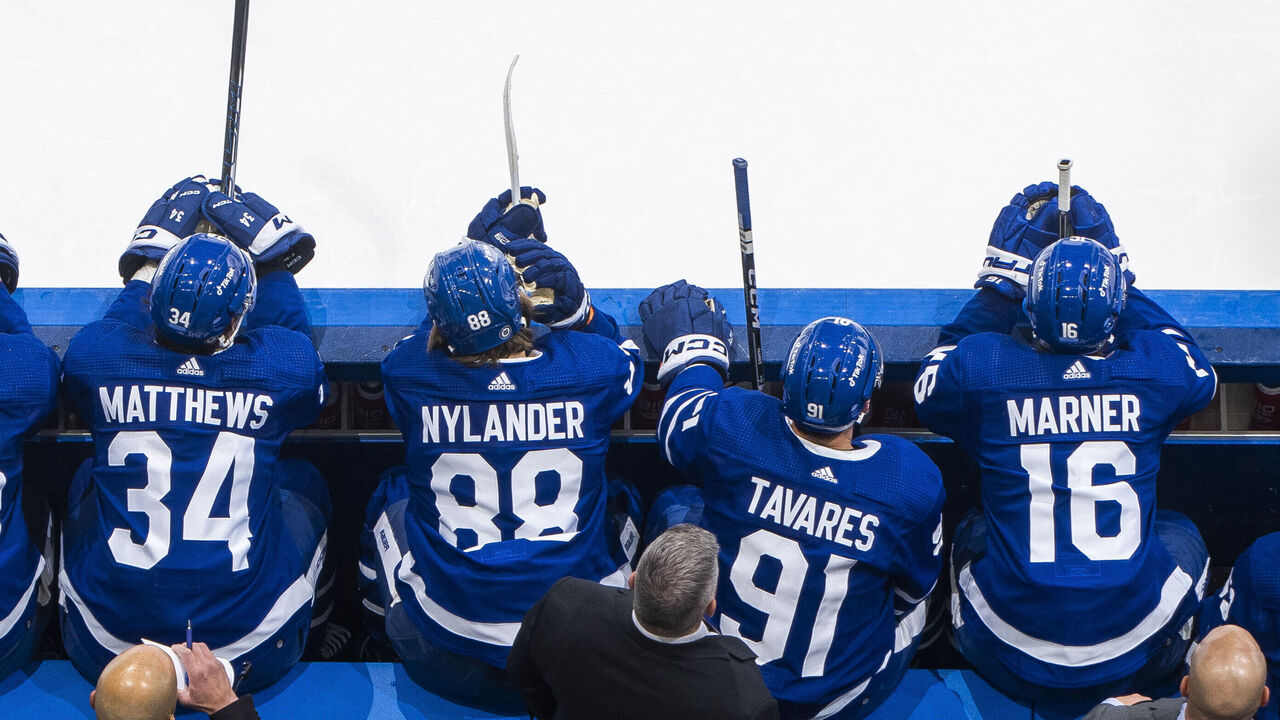
Center Auston Matthews, fresh off signing a monster contract extension, will be hungry after scoring "only" 40 goals last year. Winger Mitch Marner will be chasing his first 100-point season (99 last year). Goalie Ilya Samsonov will be out to prove any remaining doubters wrong.
General manager Brad Treliving brought in a mixed bag of newcomers. The Tyler Bertuzzi and Max Domi signings were home runs. The John Klingberg and Ryan Reaves deals were questionable. If you add 20-year-old Matthew Knies to the newcomer list, just about the same amount of talent exited Toronto: Ryan O'Reilly, Luke Schenn, Michael Bunting, Justin Holl, and Acciari.
So, in a lot of ways, it's status quo in Leafs land.
As usual, the Leafs look dangerous on paper. They should be considered the favorite to finish first in the Atlantic.
As usual, nothing matters except playoff performance in the eighth season of Matthews-Marner.
Secondary Cup favorites (Tier 2)
Elite title-contending team with minor concerns
Dallas Stars
Dallas has basically everything you'd want in a contender.
A premier talent at forward (Jason Roberton), defense (Miro Heiskanen), and in goal (Jake Oettinger) - check. A mix of proven vets (like Joe Pavelski) and promising kids (such as Wyatt Johnston) throughout the lineup - check. Good coaching - check. Recent deep runs (including six-game losses in the 2023 conference final and 2020 Cup final) - check.
General manager Jim Nill signing Matt Duchene to a one-year, $3-million deal shortly after the 32-year-old's buyout is one of the offseason's sharpest moves. Otherwise, the Stars are returning a similar roster, which is, generally speaking, a positive but also brings us to Dallas' minor concern.
If Nils Lundkvist, 23, and Thomas Harley, 22, aren't the solution to a relatively thin blue line beyond the top pair, Nill will be forced to go shopping for a midseason upgrade or two.
Edmonton Oilers
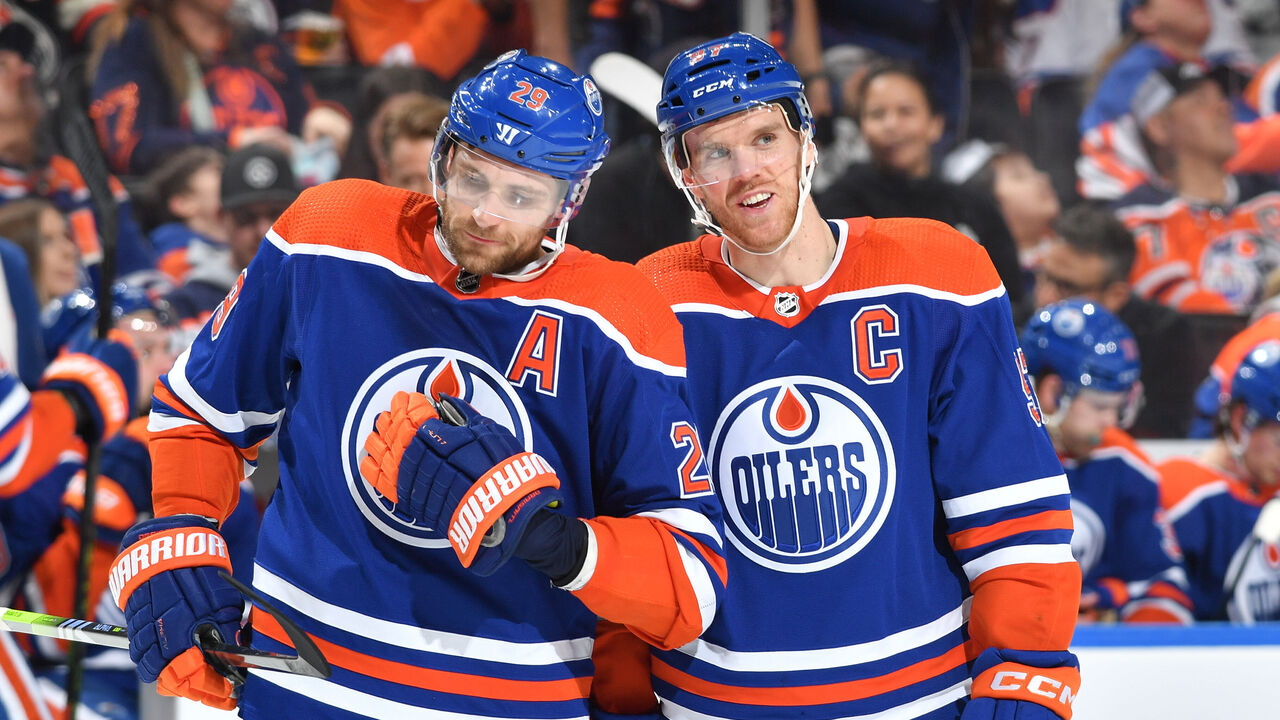
Believe it or not, this is Year 9 of the Connor McDavid-Leon Draisaitl era. The greatest forward duo since Mario Lemieux and Jaromir Jagr destroys the regular season with prolific production each year. They've often carried their teammates in the playoffs, too. But no Cup rings to date.
In fact, the Oilers haven't even made a Cup final with McDavid and Draisaitl, which means anything short of a conference final win in 2023-24 will disappoint. It took forever to get to such a place, but this group is fairly deep beyond the big dogs. I loved the no-risk Connor Brown signing in the offseason. Evan Bouchard is just scratching the surface as a top-pair defenseman. Mattias Ekholm, acquired prior to last year's trade deadline, is exactly what the blue line needed.
Expect the Oilers' historically effective power play to slow down, though only slightly. There's no reason why, with the same personnel, it can't continue to strike fear into penalty killers everywhere.
The minor concern for the Oilers is - yep - goaltending. The wild-card tandem of Stuart Skinner and Jack Campbell is really the only reason why the Oilers are slotted in Tier 2 versus Tier 1.
New Jersey Devils
Last year, the Devils announced themselves as legitimate with a franchise-high 112-point regular season. This year, they're primed to go on the first deep playoff run of Jack Hughes' career.
General manager Tom Fitzgerald has assembled a tantalizing top six: Hughes and Nico Hischier down the middle, with Toffoli, Timo Meier, Jesper Bratt, and Ondrej Palat or Dawson Mercer on the wings. The defensemen aren't too shabby, either, even after letting Graves and Damon Severson walk in free agency. Every night, it's Dougie Hamilton, Jonas Siegenthaler, John Marino, Colin Miller, Luke Hughes, and one of Simon Nemec, Brendan Smith, or Kevin Bahl.
"Potential" is the word for New Jersey. Potential division winner. Potential midseason acquisitions thanks to a wide-open contention window and assets to flip. Potential for greatness.
As is the growing trend across the league, the Devils are hoping an unheralded, low-salaried goaltending tandem can stand tall in the playoffs. That uncertainty keeps them in Tier 2 for now.
Primary Cup favorites (Tier 1)
Star-studded and deep - simply a cut above the rest
Carolina Hurricanes
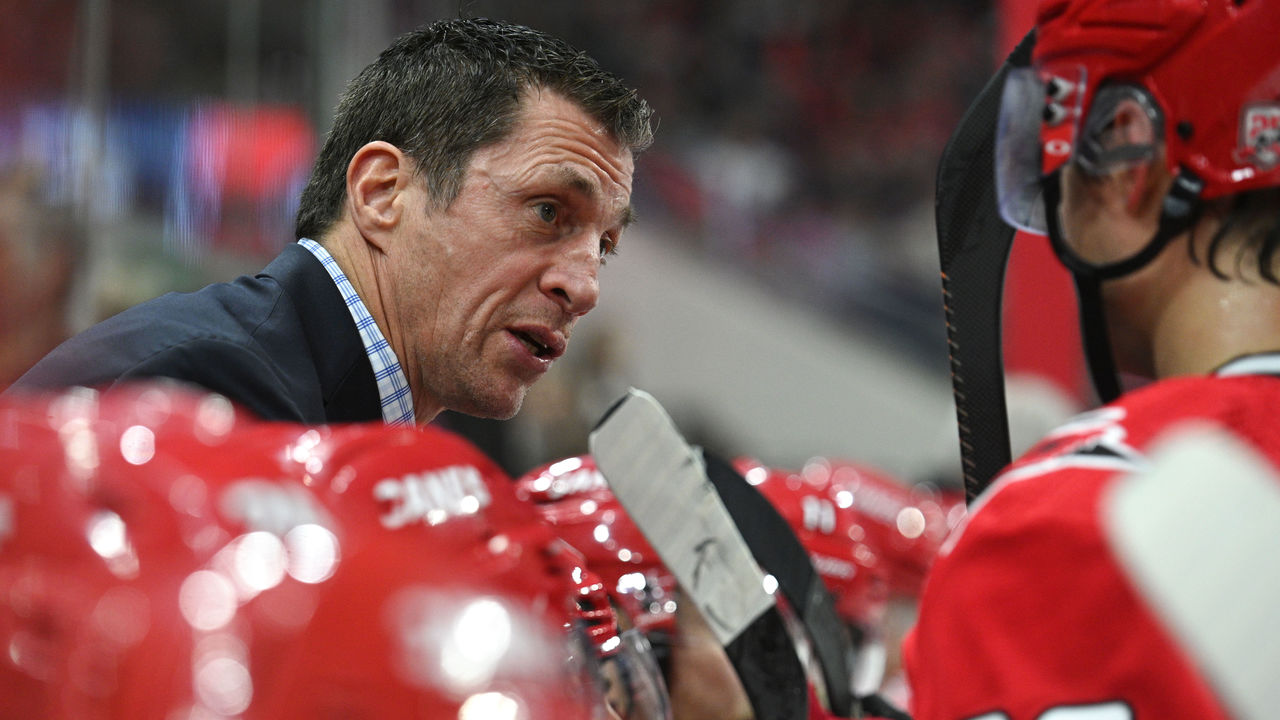
The Hurricanes have made the playoffs in each of Rod Brind'Amour's five seasons behind the bench, advancing as far as the third round twice. Over that span, the club's clever front office has managed to ice Cup-contending teams while keeping future flexibility.
This year's squad might be the most talented of the Brind'Amour era. Brent Burns, Jaccob Slavin, Dmitry Orlov, and Brett Pesce lead the NHL's best blue line. Carolina's closest thing to a superstar, elite two-way center Sebastian Aho, is in his prime. Sniper Andrei Svechnikov is healthy and hungry. Early-20s forwards Martin Necas and Seth Jarvis have untapped potential. New winger Bunting should excel in Brind'Amour's forecheck-heavy system.
Versatile and deep, the Canes now need their goal-scorers to finish and for the three-headed goaltending crew of Frederik Andersen, Antti Raanta, and Pyotr Kochetkov to hold down the fort come playoff time. General manager Don Waddell has plenty of draft capital and some enticing prospects to package should Brind'Amour need some reinforcements ahead of the trade deadline.
Colorado Avalanche
What initially jumps off the page about Colorado's roster is the immense star power. Cale Makar and Nathan MacKinnon are consensus top-five players. Mikko Rantanen sits in the 15-20 range.
Everything trickles down from the three cornerstones: the championship standards, the modern playing style preached by coach Jared Bednar, and the usage and deployment. And yet the Avalanche aren't even top-heavy. Their versatile second tier consists of Valeri Nichushkin, Ryan Johansen, and Artturi Lehkonen up front, Devon Toews and Bowen Byram on the back end, and Alexandar Georgiev between the pipes. (Gabriel Landeskog would normally be listed here, but a knee injury will keep the team captain on the shelf for the entire regular season.)
On paper, Dallas is Colorado's only competition in the Central. From there, with home-ice advantage through at least two rounds, the Avs can really do some damage - especially if general manager Chris MacFarland tinkers around the edges at the deadline or Landeskog returns.
Vegas Golden Knights
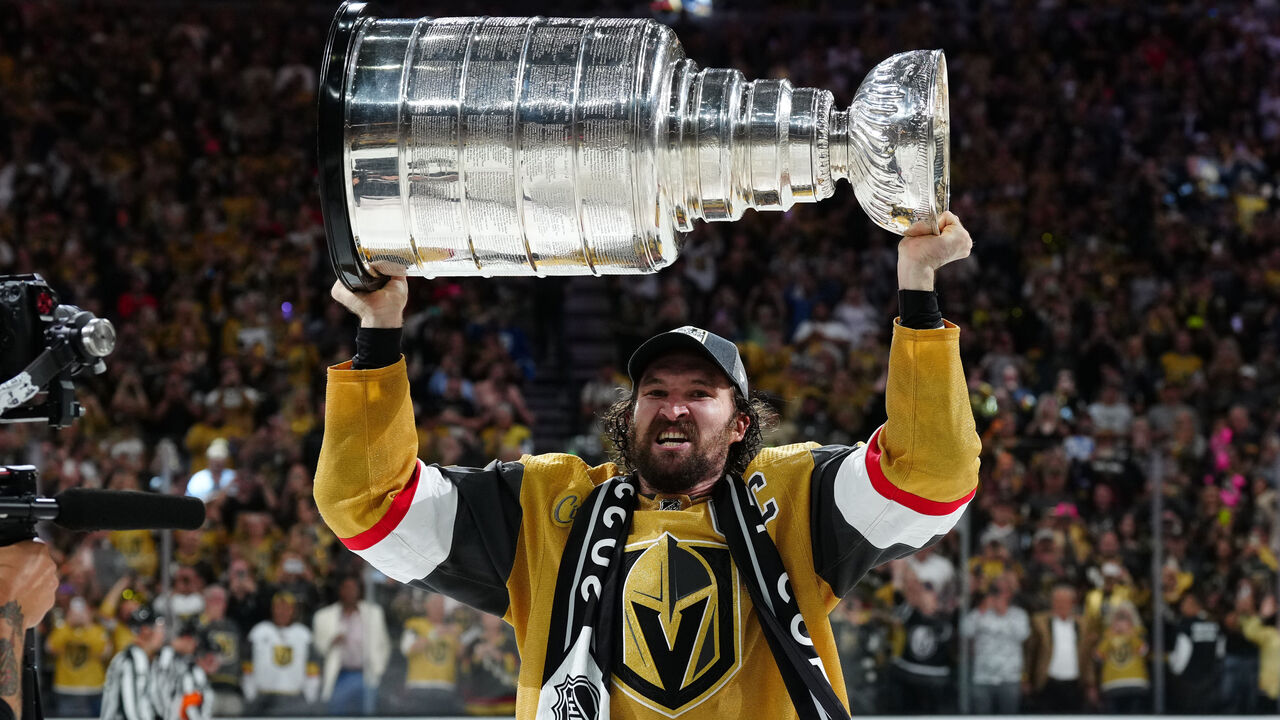
Aside from trading Reilly Smith for salary-cap relief, the defending Cup champions are running it back. So there's no need to overthink it: Vegas has a realistic shot at repeating.
The Golden Knights are well-coached, their blue line is gigantic and mobile, and, as we saw this past spring, the forward group is clutch. How does Jonathan Marchessault follow up his Conn Smythe Trophy-winning postseason? Is this the year No. 1 center Jack Eichel records 100 points? To what degree does the Nic Hague-Zach Whitecloud defense pairing dominate its inferior opponents? Those are all questions of privilege in an NHL system that can be unforgiving.
A less rosy question pertains to captain Mark Stone. Can his health hold up over the entire year?
Vegas gained a reputation for not sitting on its laurels even before winning the Cup. I highly doubt it will now. From Stone and Marchessault to Alex Pietrangelo and Alec Martinez, the roster is littered with grizzled veterans who embody the so-called killer instinct that's elusive to so many.
John Matisz is theScore's senior NHL writer. Follow John on Twitter (@MatiszJohn) or contact him via email ([email protected]).